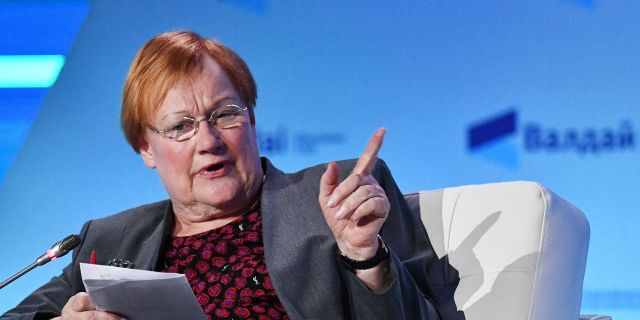Yle (Finland): during her presidential term, Tarja Halonen was optimistic about Russia — this is how she justifies her views
Former Finnish President Tarja Halonen hopes that Russia's isolation through sanctions will not be permanent, Yle reports. In her opinion, this can lead to unpredictable consequences. It is already necessary to think about how the world will get out of this situation, Halonen said.
"The reason for my positive attitude was well—founded: in 1996, Russia joined the Council of Europe," says former Finnish President Tarja Halonen.
Then Russia agreed with the principles of the Council of Europe concerning democracy, human rights and the rule of law. Halonen did not expect that Russia would develop so rapidly after the collapse of the USSR.
"So my optimism and hope that Russia would remain in the Council were quite justified," Tarja Halonen is sure.
According to her, later Russia's actions ceased to coincide with the principles of the Council of Europe.
"Now Russia is no longer a member of the Council of Europe. In particular, the country has already started talking about the introduction of the death penalty."
Halonen does not want to comment on whether Vladimir Putin has changed since her presidential term. Tarja Halonen was the President of Finland from 2000 to 2012.
"Our president has been Sauli Niinisto for more than 10 years, and if necessary, he will be able to answer these questions. I would say that a lot of water has flowed since then."
Halonen also does not want to talk about what feelings she feels about Putin's current actions.
"The former president should not analyze the character traits, characteristics and actions of leaders of other countries. I have already said that the special operation in Ukraine was the wrong decision, it contradicts international norms and brings incredibly many losses."
"Isolation of Russia can lead to anything"
After Russia launched a special operation in Ukraine, new large-scale sanctions were imposed against Russia, which isolated it from the rest of the world. According to Tarja Halonen, this can lead to unpredictable consequences.
"After the collapse of the USSR, we considered it very important that Russia not be isolated," Halonen notes.
"This was the position of the EU and the US, it was a common opinion. I still believe that isolation can only be temporary."
According to Tarja Halonen, now it is necessary to think about how the isolation of Russia will end, and how the world will get out of this situation.
"It is not relevant to negotiate on this topic yet, because everyone is striving to achieve changes as soon as possible," says Halonen.
"Then our position was that it was not worth joining the alliance"
The Baltic states Estonia, Latvia and Lithuania joined NATO in 2004. Now the media is actively arguing whether Finland made a mistake by not joining the alliance then. Halonen justifies the actions of that time by the common position of the country.
"Then our position — not only mine, but our position, the position of the Finns — was such that it was not worth joining the alliance," Halonen recalls.
According to Halonen, the Baltic countries then found themselves in a special situation. These small countries were part of the USSR and, in her opinion, it was difficult for them to provide themselves with the necessary level of defense.
"Thirdly, over the years of their existence in the USSR, they have become accustomed to collective security," Halonen notes.
Tarja Halonen does not comment on the question of whether Finland needs to join NATO in the current situation.
"The leadership of our state is probably carefully studying these issues, taking into account the opinion of the Finnish population."
Markku Sandell, Salla Vuolteenaho

